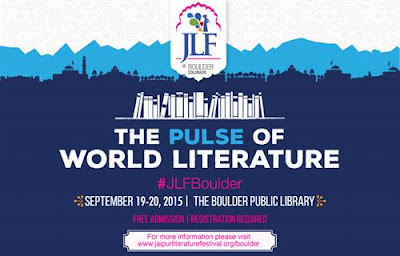 |
| The Boulder Public Library |
Luckily, that's not really what the Jaipur Literature Festival is about, as it turns out. The connection to literature was actually fairly loose. Instead of talking about books, writers of fiction and non-fiction (and some translators, too) converge to discuss all sorts of topics that they've explored in their books, but the goal is to exchange ideas rather than to promote certain works. The festival started in Jaipur, India eight (I think) years ago and has grown to be tremendously popular there (partially, one can't help but suppose, because it is free). In addition to its yearly visit to India, it has taken place in London and several other cities as well. The JLF had never occurred in the United States before, and a local couple approached the coordinators to suggest that it come to Boulder, thinking it was a pretty long shot but determined to at least propose it. To their surprise, the committee was intrigued and sent some delegates to check out the area. They promptly fell in love and the rest is history. I was a little disappointed to learn that the focus would be less on literature than I'd thought, but I figured it might be an interesting event.
The JLF took place on Saturday and Sunday. There were talks throughout both days, each lasting about 45 minutes, from 10:00 A.M. through 6:00 P.M. On average, there were three or four talks to choose from for every single time slot - in short, a lot of options. Titles on the program included "Rewilding Our Heart," "Cities and Their Shadows," "First Draft: Between Fact and Fiction," and "Matters of Faith." In other words, they were a little ambiguous. Although the website provided more detailed descriptions of the themes, the prospect of clicking through all of them seemed overwhelming, so I think most people just chose the ones that sounded most intriguing and hoped for the best. Most discussions were led by panels of three to four authors with a mediator, with time for questions from the audience at the end. Having just returned from traveling, I was happy to let our friends Diana and Joel pick the first two talks on Saturday, and Ed and I showed up to attend:
- Against the Grain: In the Times of Groupspeak - Margo Jefferson, Adrian Molina and Ryan Gattis moderated by David Barsamian
- Twilight Zones - Kai Bird, Simon Sebag Montefiore, and William Dalrymple, moderated by Nur Laiq
Happily, Twilight Zones (which, as it turned out, was about the Middle East) was fascinating and expertly run. All three panelists were historians, and their conversation, expertly mediated by author and Middle Eastern scholar Nur Laiq, was fascinating.
I was on my own for Sunday, so I chose to attend:
- Twice Told Texts: The Inner Life of Translations - Antonio Ruiz-Camacho, Arvind Krishna Mehrotra, Christi Merrill, and Linda Hess, moderated by Arshia Sattar
- Jerusalem - Brian Aivars Catlos, Nur Laiq, and Simon Sebag Montefiore, moderated by Sanjoy Roy
Both sessions, thankfully, bore no resemblance to Against the Grain. The discussion about translation was particularly interesting for me, as it's a subject that I've always found fascinating. Two of the panelists were translators of poetry, which I've always imagined must be the most difficult type of text to work with, and there was plenty of lively debate about whether to translate word-for-word as much as possible, forget the words and try to evoke the meaning of the original poem, or try for something in between. Jerusalem was, predictably, fascinating as well, and I learned a great deal about the history of a city I've often visited but known comparatively little about. One of the panelists was a Medieval historian who teaches at CU, and Nur Laiq, who spends most of her time interviewing Arab youth about their perceptions of current events, sat beside him, so we heard very interesting and diverse information. I was so interested that I bought a copy of Jerusalem (the book) in the JLF gift shop and had it signed by Simon Sebag Montefiore, the third panelist. It's a fairly monstrous tome and I both look forward to, and dread, diving into it.

No comments:
Post a Comment